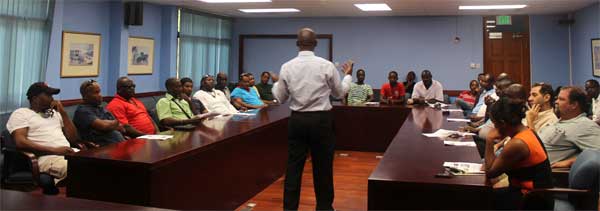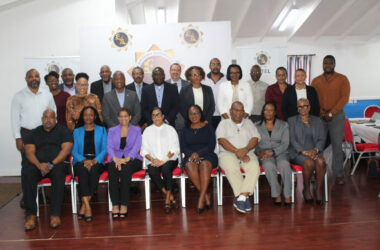SLASPA Official Cites Importance of Port Security.

BOAT operators on the island received quite an earful Tuesday about what is expected of them while operating within the country’s sea ports that are compliant with the International Ship and Port Facility Security (ISPS) Code.
“There are certain things that are happening right now that are not in keeping with the guidelines of the ISPS Code,” Christopher Alexander said.
Alexander, who is the Director of Maritime Affairs at the St. Lucia Air and Sea Ports Authority (SLASPA) noted that SLASPA had received certain complaints from vessels that are ISPS-compliant when in port.
“The biggest concern that we have is that some of the boats pass to close to some of the cruise ships in the Castries harbour. There is a certain distance boats must stay away from cruise ships,” he said.
Tuesday’s meeting was to address these concerns.
The ISPS Code is an amendment to the Safety of Life at Sea (SOLAS) Convention on minimum security arrangements for ships, ports and government agencies. It came into force in 2004 and prescribes responsibilities of governments, shipping companies, shipboard personnel, and port/facility personnel to detect security threats and take preventative measures against security incidents affecting ships or port facilities used in international trade.
The ISPS Code is seen as a comprehensive set of measures to enhance the security of ships and port facilities and was developed in response to the perceived threats to ships and port facilities in the wake of the 9/11 attacks in the United States.
Development and implementation of the Code were sped up drastically in reaction to the September 11, 2001 attacks. It was the United States Coast Guard that advocated for the measure. The Code was agreed at a meeting of the 108 signatories to the SOLAS convention in London in December 2002. The measures agreed under the Code were brought into force on July 1, 2004.
An assessment of sea ports in St. Lucia that are ISPS-compliant was made by an ISPS officer based in the U.S. Coast Guard, which, according to Nadine George, Inspector of Police attached to the Marine Unit of the Police Force, went “pretty well”.
“Only two facilities had some small areas that had to be addressed and hopefully that would be addressed in the near future,” she said.
There are about 400 boat operators/owners in the country and according to Alexander, SLASPA’s goal is to ensure that each knows his/her responsibilities as pertaining to the ISPS Code and its rules.
“When the foreign boats come here they expect that St. Lucia sea farers operate within international standards,” Alexander said.
He saw Tuesday’s meeting as particularly important to operators who are continually employed in boat rides. They were shown how to enhance security on board their vessels, how to avoid having contraband stowed on their vessels and other things.
The ISPS Code is a two-part document; one part dealing with mandatory requirements while the second part (Part B) providing guidance for implementation.
The ISPS Code applies to ships on international voyages including passenger ships, cargo ships of 500 gross tons and upwards, mobile offshore drilling units and the port facilities serving such ships.
The main objectives of the ISPS Code are: to detect security threats and implement security measures; establish roles and responsibilities concerning maritime security for governments, local administrations, ship and port industries at the national and international level; collate and promulgate security-related information and provide a methodology for security assessments so as to have in place plans and procedures to react to changing security levels.
















